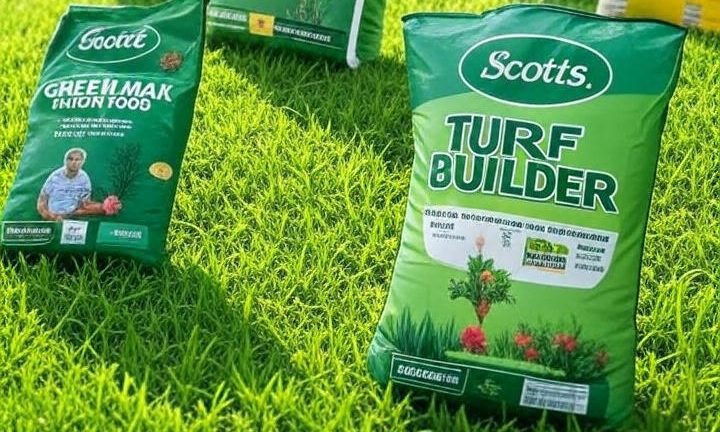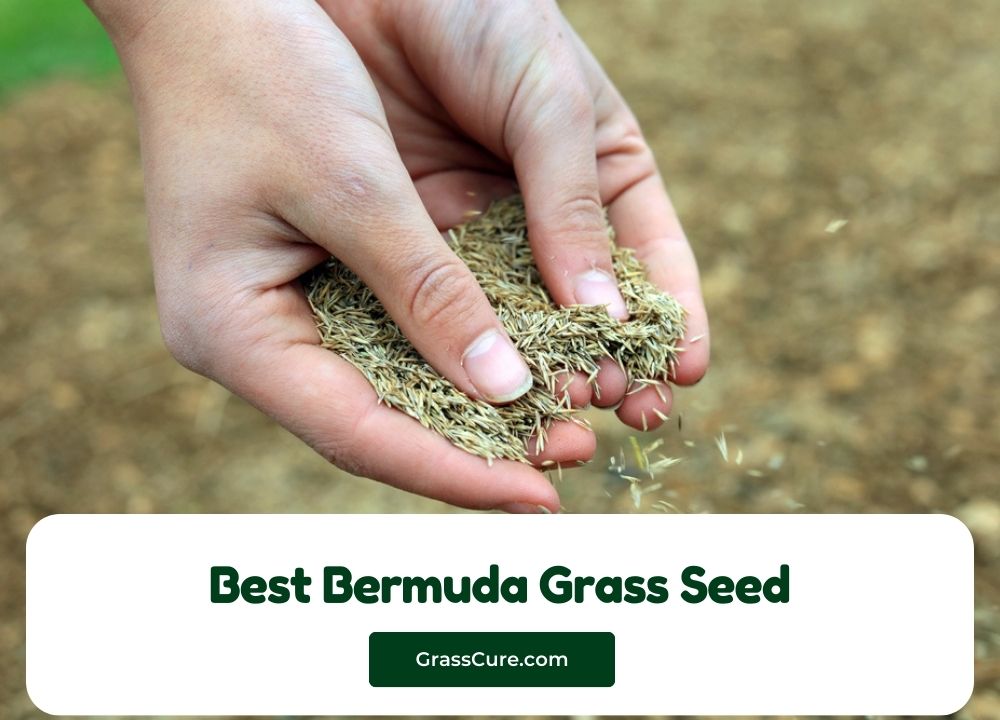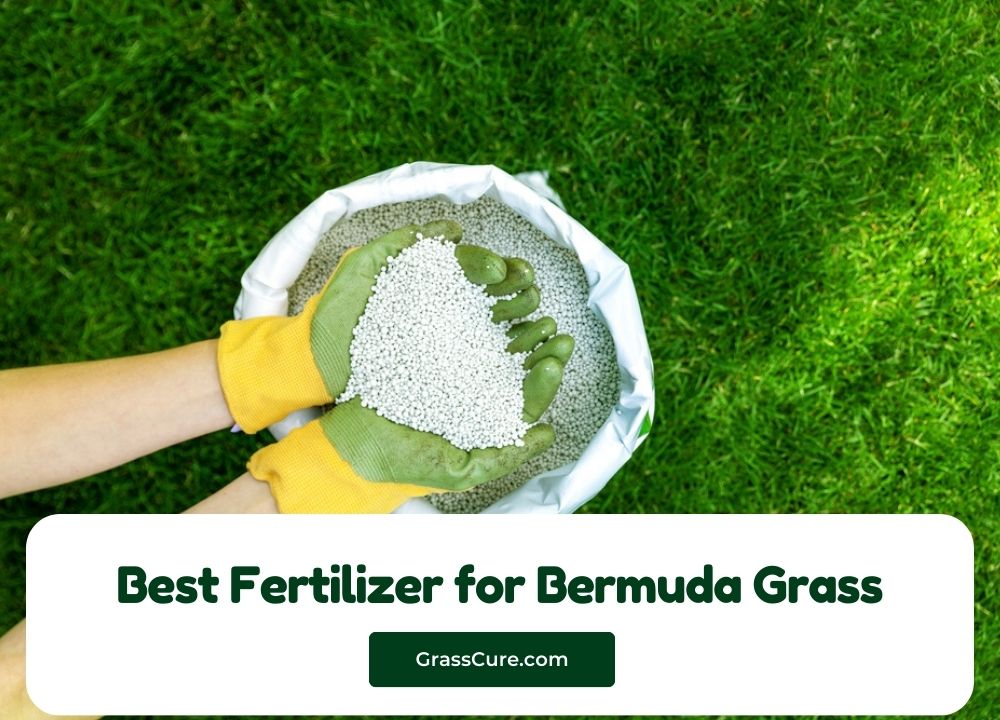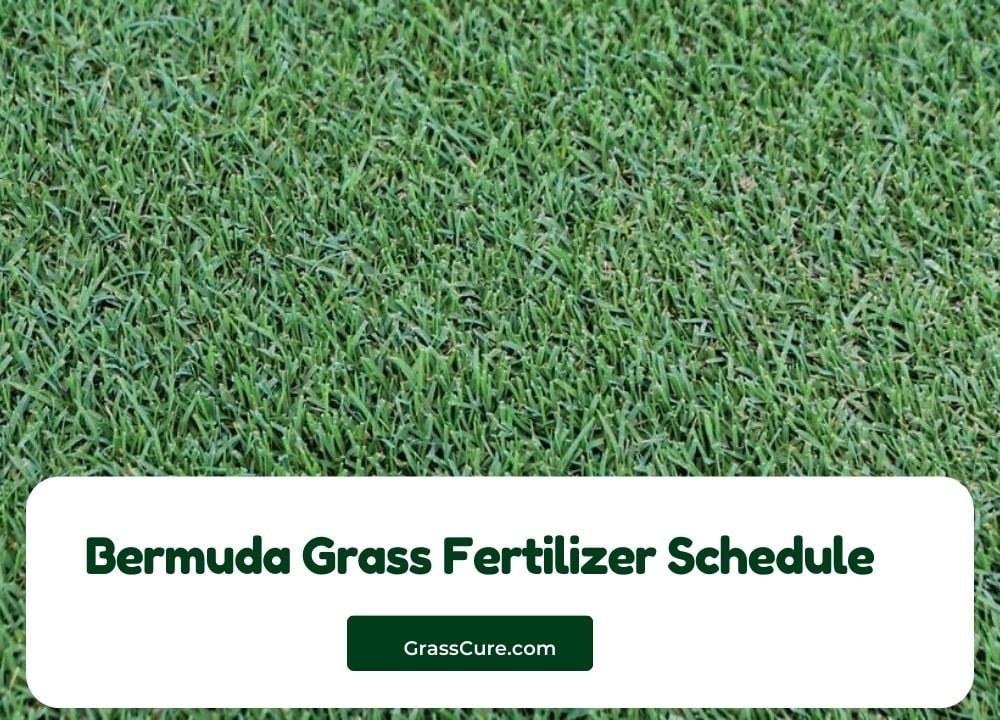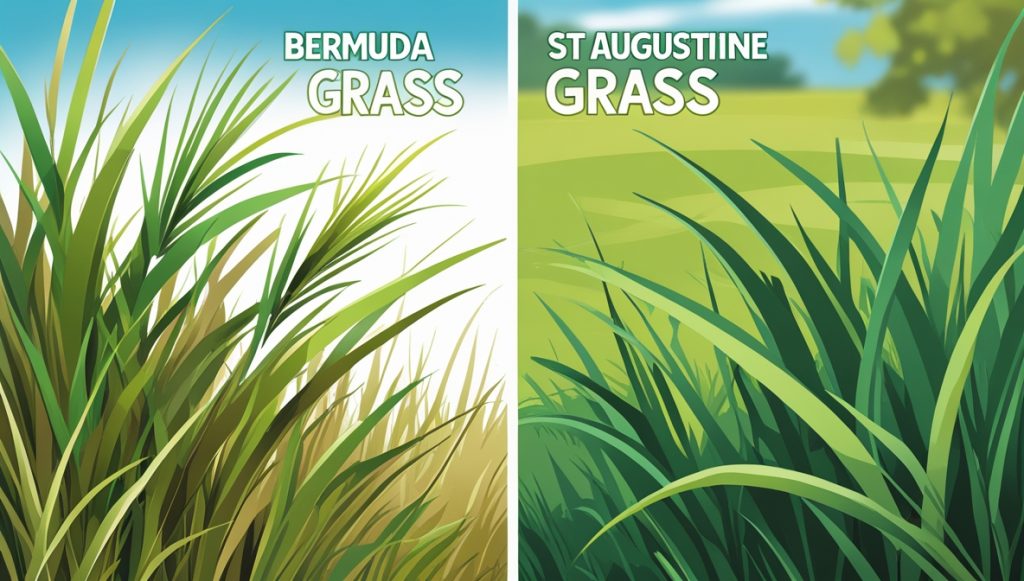Bermuda grass lawns radiate beauty when properly cared for, but achieving that vibrant, thick turf requires the right fertilizer. Scotts, a trusted name in lawn care, offers a range of products tailored to nourish Bermuda grass, promote deep green color, and tackle weeds. After thorough research and hands-on testing, I’ve rounded up the top five Scotts fertilizers to transform your Bermuda lawn into a neighborhood showstopper. Whether you seek rapid greening, weed control, or fast-growing grass, this guide breaks down the best options, their benefits, and how to use them for optimal results.
In this review, you’ll discover which Scotts fertilizer suits your Bermuda grass needs. I’ve included product details, pros and cons, application tips, and insights from real users. Let’s dive into creating a lawn you’ll love to show off!
Contents
- Why Choose Scotts for Bermuda Grass?
- 1. Scotts Green Max Lawn Food – Best for Fast Greening
- 2. Scotts Turf Builder Lawn Food – Best All-Purpose Fertili
- 3. Scotts Turf Builder Weed & Feed3 – Best for Weed Control
- 4. Scotts Turf Builder Rapid Grass Bermudagrass – Best for New or Thin Lawns
- 5. Scotts Liquid Turf Builder Lawn Fertilizer – Best for Easy Application
- How to Choose the Best Scotts Fertilizer for Your Bermuda Grass
- Bermuda Grass Fertilizer Tips for Success
- Common Mistakes to Avoid
- Comparing Scotts Fertilizers: Quick Reference Table
- Why Bermuda Grass Needs Special Care
- FAQs About Scotts Fertilizers for Bermuda Grass
- Final Thoughts: Which Scotts Fertilizer Wins for Bermuda Grass?
Why Choose Scotts for Bermuda Grass?
Bermuda grass thrives in warm climates, loves full sun, and demands nutrient-rich soil to stay lush. Its fast-growing nature means it hungers for nitrogen, potassium, and sometimes iron to maintain that deep green hue and dense growth. Scotts fertilizers stand out for their science-backed formulas, like All-in-One Particles technology, which ensures even nutrient delivery. They’re easy to apply, widely available, and designed to tackle specific lawn challenges, from thinning grass to pesky weeds.
Before we explore the top picks, consider these key factors for Bermuda grass care:
- Nitrogen: Fuels vibrant color and rapid growth.
- Potassium: Boosts drought and disease resistance.
- Iron: Enhances greening for a standout lawn.
- Timing: Apply in spring or early summer when soil temperatures hit 65°F–90°F.
- Weed Control: Many Scotts products combine fertilization with weed-killing power.
Now, let’s jump into the best Scotts fertilizers for Bermuda grass, starting with a standout for quick results.
1. Scotts Green Max Lawn Food – Best for Fast Greening

Coverage: 5,000 sq. ft.
NPK Ratio: 27-0-2
Key Feature: 5% iron for greening in just 3 days
If you want your Bermuda grass to turn heads with a deep green glow in record time, Scotts Green Max Lawn Food delivers. This high-nitrogen fertilizer, spiked with 5% iron, transforms lackluster lawns in as little as three days. Its 27-0-2 NPK ratio pumps nitrogen into the grass for lush growth while potassium strengthens roots against heat and drought—perfect for Bermuda’s warm-season needs.
Why It’s Great for Bermuda Grass
Bermuda grass craves nitrogen to fuel its vigorous growth, and Green Max’s 27% nitrogen content hits the mark. The added iron tackles yellowing, a common issue in nutrient-deficient lawns, giving your turf a vibrant, uniform color. You can apply it on wet or dry grass, and it’s safe to walk on immediately, making it ideal for busy households with kids or pets.
How to Apply
Use a Scotts broadcast or rotary spreader set to 3¼–3¾ for even coverage. Apply every 6–8 weeks during the growing season (spring through summer). Water lightly after application to activate the nutrients, though it’s not mandatory. Avoid overapplying to prevent burn, especially on hot days.
Pros
- Greens grass in 3 days, perfect for quick results.
- High nitrogen promotes thick, dense turf.
- Iron enhances color without extra effort.
- Safe for all grass types, including Bermuda.
- Easy to spread with consistent granules.
Cons
- No phosphorus, so not ideal for new lawns needing root growth.
- May burn grass if overapplied—follow instructions carefully.
- Pricier than some basic fertilizers.
User Feedback
Homeowners rave about Green Max’s speed. One Amazon reviewer shared, “My Bermuda lawn went from pale to emerald green in four days! Neighbors thought I painted it.” Another noted, “It’s pricy, but the results are worth it. My grass looks thicker and healthier.” Some cautioned about burn risks, emphasizing the need to measure accurately.
Best For
Homeowners seeking fast, dramatic greening and thicker Bermuda grass without weed control.
Scotts Green Max Lawn Food Application Guide
markdownShow inline
2. Scotts Turf Builder Lawn Food – Best All-Purpose Fertili

Coverage: 5,000 sq. ft.
NPK Ratio: 32-0-4
Key Feature: All-in-One Particles for strong roots
For a versatile fertilizer that keeps Bermuda grass thriving through heat and drought, Scotts Turf Builder Lawn Food shines. Its 32-0-4 NPK ratio delivers a hefty dose of nitrogen for lush growth and potassium for resilience. The All-in-One Particles technology ensures nutrients reach deep roots, making your lawn tougher against Southern stressors like scorching summers.
Why It’s Great for Bermuda Grass
This fertilizer’s high nitrogen content (32%) fuels Bermuda’s rapid growth, while 4% potassium boosts drought tolerance—crucial for warm-season grasses. It’s safe for all grass types, so you can use it on mixed lawns. Apply it any time during the growing season, wet or dry, for flexible lawn care.
How to Apply
Spread using a Scotts rotary spreader set to 3–3½. Apply every 6–8 weeks from spring to early fall. Light watering after application helps nutrients soak in, but it’s not required. One 12.5-lb. bag covers 5,000 sq. ft., making it cost-effective for medium-sized lawns.
Pros
- High nitrogen for vibrant, thick Bermuda grass.
- Potassium strengthens roots against heat and drought.
- Easy to apply with uniform granules.
- Budget-friendly for large lawns.
- Safe for immediate use after application.
Cons
- Lacks phosphorus, not ideal for establishing new lawns.
- No weed control, so pair with a separate herbicide if needed.
- Granules can clump in humid conditions.
User Feedback
Users love its reliability. A Home Depot reviewer said, “My Bermuda lawn stays green and thick all summer with this. It’s my go-to every year.” Another praised its ease, noting, “No fuss, just spread and watch the grass grow.” Some wished it included weed control, but most appreciated its simplicity for basic feeding.
Best For
Lawn owners wanting a straightforward, high-nitrogen fertilizer for consistent Bermuda grass health.
3. Scotts Turf Builder Weed & Feed3 – Best for Weed Control

Price: ~$25–$35
Coverage: 5,000 sq. ft.
NPK Ratio: 28-0-3
Key Feature: Kills dandelions and clover while feeding grass
Weeds like dandelions and clover can invade Bermuda grass, stealing nutrients and ruining its look. Scotts Turf Builder Weed & Feed3 tackles this problem head-on, combining a 28-0-3 fertilizer with powerful weed killers. It feeds your lawn while eliminating over 50 common weeds, giving Bermuda the edge to grow thick and crowd out future invaders.
Why It’s Great for Bermuda Grass
Bermuda grass benefits from the 28% nitrogen for lush growth and 3% potassium for stress resistance. The weed-killing formula targets broadleaf weeds without harming Bermuda, making it a dual-purpose solution. Apply it in spring or early summer to stop weeds early and boost grass density.
How to Apply
Use a Scotts spreader set to 3½–4. Apply to wet grass for better weed killer adhesion, but avoid rainy days to prevent runoff. One 14.29-lb. bag covers 5,000 sq. ft. Wait 24–48 hours before watering, and don’t mow for 1–2 days after application to maximize weed control.
Pros
- Kills dandelions, clover, and other broadleaf weeds.
- High nitrogen promotes dense Bermuda growth.
- One application handles feeding and weed control.
- Covers large areas affordably.
- Easy to find at major retailers.
Cons
- Not safe for all grass types (avoid on St. Augustine or centipede).
- Requires precise application to avoid lawn damage.
- Weed control may need multiple applications for stubborn weeds.
User Feedback
Reviewers praise its weed-killing power. A Lowe’s customer shared, “Dandelions were gone in a week, and my Bermuda looks thicker than ever.” Another said, “It’s a time-saver—no need for separate weed spray.” Some noted spotty weed control with heavy infestations, suggesting a follow-up application.
Best For
Homeowners battling weeds while wanting to nourish their Bermuda grass.
4. Scotts Turf Builder Rapid Grass Bermudagrass – Best for New or Thin Lawns

Coverage: 1,498 sq. ft. (new lawn), 5,000 sq. ft. (overseeding)
NPK Ratio: Not specified (seed + fertilizer mix)
Key Feature: Grows grass 2x faster than seed alone
If your Bermuda lawn is patchy or you’re starting fresh, Scotts Turf Builder Rapid Grass Bermudagrass offers a game-changing solution. This 3-in-1 mix combines premium Bermuda grass seed, fertilizer, and soil improver to grow full, green grass in 21–28 days. It’s designed for tough conditions, perfect for Bermuda’s heat-loving nature.
Why It’s Great for Bermuda Grass
This product addresses thin or bare spots by seeding and feeding simultaneously. The fertilizer provides essential nutrients for new grass, while the soil improver enhances root development. It grows 2x faster than seed alone, making it ideal for quick lawn establishment or overseeding existing Bermuda.
How to Apply
Prepare the lawn by mowing to 2 inches and raking to loosen soil. Use a Scotts spreader set to 3¾ (broadcast) or 10½ (drop). Apply in spring or early summer when air temperatures are 70°F–90°F. Water daily for two weeks to keep soil moist until seedlings reach 2 inches. Avoid weed killers for at least four mowings.
Pros
- Grows thick Bermuda grass in weeks.
- Ideal for new lawns or patching thin areas.
- Easy-to-use seed and fertilizer combo.
- Works in hot, sunny conditions.
- High user ratings for fast results.
Cons
- Smaller coverage area for new lawns (1,498 sq. ft.).
- Requires consistent watering for germination.
- Not a standalone fertilizer for established lawns.
User Feedback
Users are impressed with its speed. An Amazon reviewer wrote, “Bare spots in my Bermuda lawn filled in within three weeks. It’s lush now!” Another shared, “Even after heavy rain, the seeds sprouted fast.” Some noted the need for diligent watering, but results were consistently strong.
Best For
Homeowners establishing a new Bermuda lawn or fixing patchy areas.
5. Scotts Liquid Turf Builder Lawn Fertilizer – Best for Easy Application
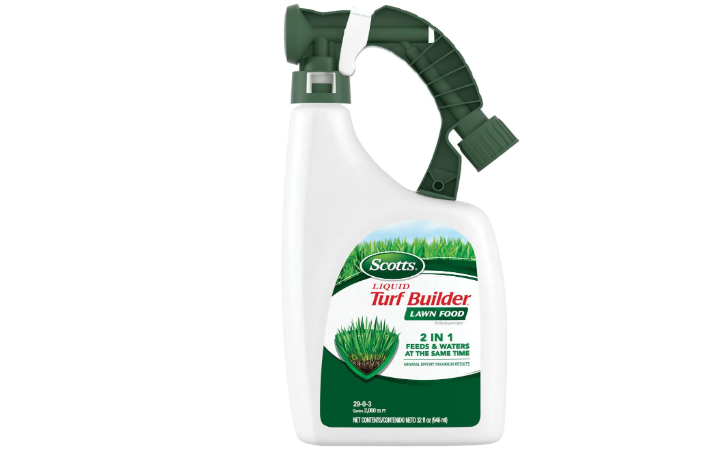
Coverage: 2,000 sq. ft.
NPK Ratio: 29-0-3
Key Feature: Feeds and waters lawn simultaneously
For those who prefer a no-fuss approach, Scotts Liquid Turf Builder Lawn Fertilizer simplifies Bermuda grass care. This ready-to-spray liquid fertilizer attaches to a garden hose, delivering a 29-0-3 nutrient blend that feeds and waters your lawn in one step. It’s perfect for smaller lawns or quick touch-ups.
Why It’s Great for Bermuda Grass
The 29% nitrogen content supports Bermuda’s need for rapid, green growth, while 3% potassium boosts resilience. The liquid formula absorbs quickly through grass blades and roots, providing instant nourishment. It’s ideal for busy homeowners who want results without spreader hassle.
How to Apply
Attach the bottle to a garden hose and spray evenly across your lawn. One 32 fl. oz. bottle covers 2,000 sq. ft. Apply every 6–8 weeks during the growing season. No watering is needed post-application, as the product includes water. Avoid spraying on non-lawn areas to prevent runoff.
Pros
- Super easy to apply with hose-end sprayer.
- High nitrogen for vibrant Bermuda growth.
- No spreader required, saving time.
- Affordable for small to medium lawns.
- Immediate nutrient absorption.
Cons
- Smaller coverage area (2,000 sq. ft.).
- Less cost-effective for large lawns.
- No weed control or soil improvement.
User Feedback
Users love the convenience. A Walmart reviewer said, “I sprayed it on my Bermuda lawn, and it was greener in days. So easy!” Another noted, “Perfect for my small yard—no mess, no stress.” Some wished for larger bottles for bigger lawns, but most appreciated the simplicity.
Best For
Homeowners with small Bermuda lawns or those seeking a low-effort fertilizer.
How to Choose the Best Scotts Fertilizer for Your Bermuda Grass
Selecting the right fertilizer depends on your lawn’s needs and your goals. Here’s a quick guide to match each product to common scenarios:
- Fast Greening: Choose Scotts Green Max Lawn Food for its iron-enhanced formula that delivers results in 3 days.
- General Maintenance: Scotts Turf Builder Lawn Food offers high-nitrogen feeding for consistent health.
- Weed Issues: Scotts Turf Builder Weed & Feed3 kills weeds while nourishing Bermuda grass.
- New or Patchy Lawns: Scotts Turf Builder Rapid Grass Bermudagrass grows thick grass fast.
- Ease of Use: Scotts Liquid Turf Builder is perfect for quick, hassle-free application.
Consider these tips:
- Soil Test: Test your soil to check for nutrient deficiencies, especially phosphorus.
- Lawn Size: Match coverage to your yard size to avoid overspending.
- Weed Presence: If weeds are a problem, prioritize Weed & Feed3 or pair other fertilizers with a liquid herbicide like Celsius WG.
- Application Frequency: Most products need reapplication every 6–8 weeks during the growing season.
Bermuda Grass Fertilizer Tips for Success
To maximize your Scotts fertilizer’s impact, follow these best practices:
- Time It Right: Apply in spring or early summer when Bermuda grass is actively growing (soil temps 65°F–90°F).
- Water Wisely: Water lightly after granular applications unless specified otherwise. For Rapid Grass, keep soil moist for two weeks.
- Mow Properly: Mow Bermuda to 1–2 inches before applying to ensure even nutrient uptake.
- Use a Spreader: Scotts spreaders ensure uniform application, reducing burn risk.
- Avoid Overlap: Overapplying can burn Bermuda grass, especially with high-nitrogen formulas.
- Pair with Pre-Emergents: Use a pre-emergent like prodiamine in early spring to prevent weeds, complementing Weed & Feed3.
Common Mistakes to Avoid
Even the best fertilizers can underperform if misused. Steer clear of these pitfalls:
- Overapplying: Excess nitrogen burns Bermuda grass, causing brown patches. Stick to recommended spreader settings.
- Ignoring Labels: Products like Weed & Feed3 aren’t safe for all grasses—confirm compatibility with Bermuda.
- Poor Timing: Applying during dormancy (winter) or extreme heat wastes product and risks damage.
- Skipping Soil Prep: For Rapid Grass, failing to rake or loosen soil hinders seed germination.
- Neglecting Weeds: If using non-weed-control fertilizers, monitor for weeds and treat separately.
Comparing Scotts Fertilizers: Quick Reference Table
| Product | Coverage | NPK | Best For |
|---|---|---|---|
| Green Max Lawn Food | 5,000 sq. ft. | 27-0-2 | Fast greening |
| Turf Builder Lawn Food | 5,000 sq. ft. | 32-0-4 | General maintenance |
| Turf Builder Weed & Feed3 | 5,000 sq. ft. | 28-0-3 | Weed control |
| Rapid Grass Bermudagrass | 1,498–5,000 sq. ft. | Not listed | New or thin lawns |
| Liquid Turf Builder | 2,000 sq. ft. | 29-0-3 | Easy application |
Why Bermuda Grass Needs Special Care
Bermuda grass, a warm-season turf, grows aggressively but demands consistent nutrients to stay healthy. Without proper fertilization, it can turn yellow, thin out, or fall prey to weeds and pests. Nitrogen drives its vibrant color and density, while potassium helps it withstand drought, heat, and cold. Iron, found in products like Green Max, corrects chlorosis (yellowing) for a richer green. Scotts fertilizers are formulated to meet these needs, but always check your soil’s pH (ideal: 6.0–7.0) and nutrient levels for tailored care.
FAQs About Scotts Fertilizers for Bermuda Grass
Q: How often should I fertilize Bermuda grass?
A: Fertilize every 6–8 weeks during the growing season (spring to early fall), aiming for 4–5 lbs. of nitrogen per 1,000 sq. ft. annually.
Q: Can I use Scotts Weed & Feed3 on new Bermuda grass?
A: Avoid Weed & Feed3 on new lawns until the grass is established (after 4 mowings). Use Rapid Grass or Turf Builder Lawn Food instead.
Q: Is liquid fertilizer better than granular for Bermuda?
A: Liquid (like Scotts Liquid Turf Builder) absorbs faster but covers less area. Granular options (like Green Max) are better for large lawns and long-term feeding.
Q: Will these fertilizers burn my Bermuda grass?
A: Overapplication can cause burn, especially with high-nitrogen products. Follow spreader settings and avoid applying during extreme heat.
Q: Can I use these fertilizers in fall?
A: Yes, but focus on products like Turf Builder Lawn Food to strengthen roots before winter. Avoid Rapid Grass in fall, as germination slows in cooler temps.
Final Thoughts: Which Scotts Fertilizer Wins for Bermuda Grass?
Choosing the best Scotts fertilizer for Bermuda grass depends on your lawn’s condition and your priorities. For rapid greening, Scotts Green Max Lawn Food steals the show with its iron-infused formula. If you need a reliable all-purpose option, Scotts Turf Builder Lawn Food keeps Bermuda healthy and vibrant. Battling weeds? Scotts Turf Builder Weed & Feed3 tackles invaders while feeding your grass. For new or patchy lawns, Scotts Turf Builder Rapid Grass Bermudagrass delivers fast, thick growth. And for hassle-free care, Scotts Liquid Turf Builder makes application a breeze.
No matter which you pick, proper application and timing are key to a thriving Bermuda lawn. Pair these fertilizers with regular mowing, watering, and weed prevention for a yard that shines all season. Ready to transform your lawn? Grab your Scotts fertilizer, fire up that spreader, and watch your Bermuda grass become the envy of the block!
